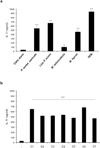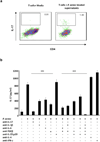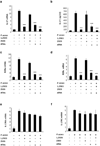Propionibacterium acnes Induces an IL-17 Response in Acne Vulgaris that Is Regulated by Vitamin A and Vitamin D
- PMID: 23924903
- PMCID: PMC4084940
- DOI: 10.1038/jid.2013.334
Propionibacterium acnes Induces an IL-17 Response in Acne Vulgaris that Is Regulated by Vitamin A and Vitamin D
Abstract
Acne vulgaris is the most common skin disorder affecting millions of people worldwide and inflammation resulting from the immune response targeting Propionibacterium acnes has a significant role in its pathogenesis. In this study, we have demonstrated that P. acnes is a potent inducer of T helper 17 (Th17) and Th1, but not Th2 responses in human peripheral blood mononuclear cells (PBMCs). P. acnes stimulated expression of key Th17-related genes, including IL-17A, RORα, RORc, IL-17RA, and IL-17RC, and triggered IL-17 secretion from CD4(+), but not from CD8(+) T cells. Supernatants from P. acnes-stimulated PBMCs were sufficient to promote the differentiation of naive CD4(+)CD45RA T cells into Th17 cells. Furthermore, we found that the combination of IL-1β, IL-6, and transforming growth factor-β-neutralizing antibodies completely inhibited P. acnes-induced IL-17 production. Importantly, we showed that IL-17-expressing cells were present in skin biopsies from acne patients but not from normal donors. Finally, vitamin A (all-trans retinoic acid) and vitamin D (1,25-dihydroxyvitamin D3) inhibited P. acnes-induced Th17 differentiation. Together, our data demonstrate that IL-17 is induced by P. acnes and expressed in acne lesions and that both vitamin A and D could be effective tools to modulate Th17-mediated diseases such as acne.
Conflict of interest statement
The authors state no conflict of interest.
Figures






Comment in
-
IL-17: a key player in the P. acnes inflammatory cascade?J Invest Dermatol. 2014 Feb;134(2):307-310. doi: 10.1038/jid.2013.400. J Invest Dermatol. 2014. PMID: 24424453
References
-
- Acosta-Rodriguez EV, Napolitani G, Lanzavecchia A, Sallusto F. Interleukins 1beta and 6 but not transforming growth factor-beta are essential for the differentiation of interleukin 17-producing human T helper cells. Nature immunology. 2007;8:942–949. - PubMed
-
- Amadi-Obi A, Yu CR, Liu X, Mahdi RM, Clarke GL, Nussenblatt RB, et al. TH17 cells contribute to uveitis and scleritis and are expanded by IL-2 and inhibited by IL-27/STAT1. Nature medicine. 2007;13:711–718. - PubMed
-
- Barksdale L, Kim KS. Propionibacterium, Corynebacterium, Mycobacterium and Lepra bacilli. Acta Leprol. 1984;2:153–174. - PubMed
Publication types
MeSH terms
Substances
Grants and funding
LinkOut - more resources
Full Text Sources
Other Literature Sources
Medical
Research Materials

